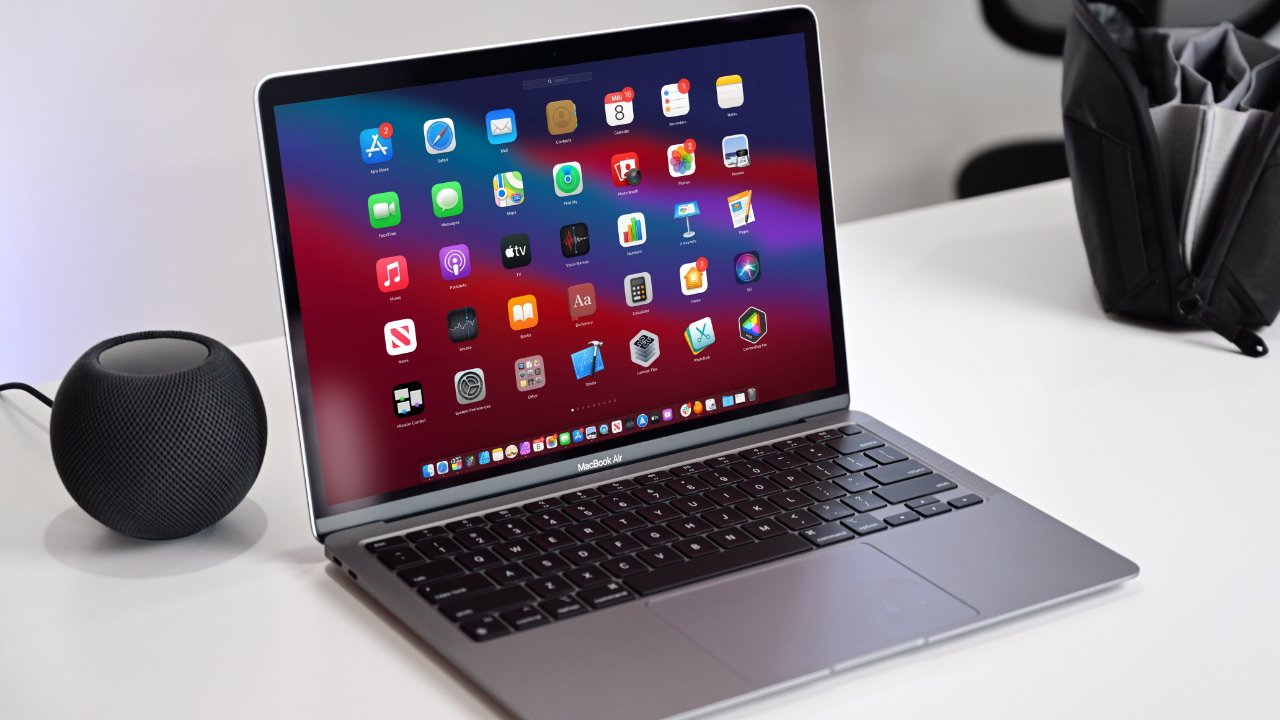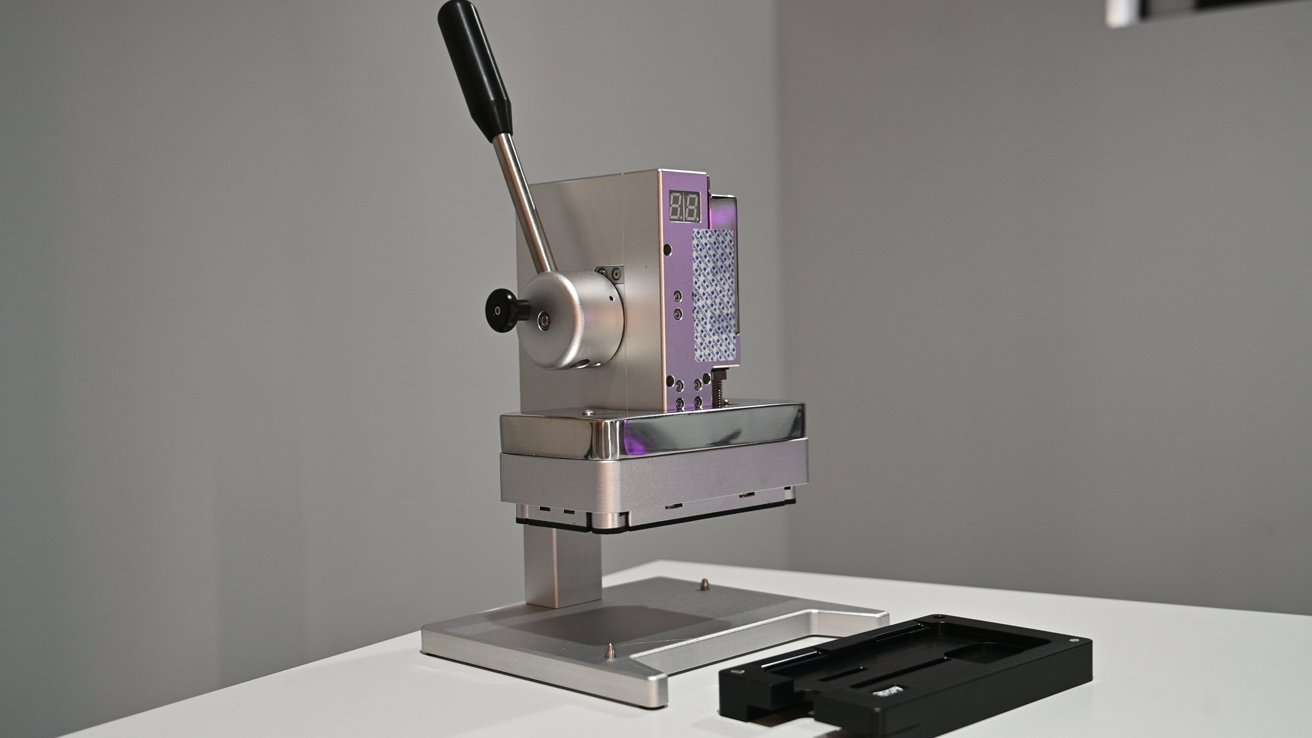Right-to-repair advocate urges Apple to let resellers bypass security protocols
One independent MacBook reseller and right-to-repair advocate has scavenged Macs from a facility that destroys computers for security reasons, and wants Apple to let him disable iCloud Activation Locks.

2020 M1 MacBooks are making their way to recycling centers
John Bumstead has a business refurbishing and reselling used Macs via his RDKL INC repair store. Apple doesn't make his life easy as a business owner seeking to sell used computers on the cheap.
Products that are no longer being used by businesses, schools, and the government are often given to recycling centers with strict disposal rules to protect data. These centers are often certified by the Responsible Recycling standard, referred to as R2.
Resellers like Bumstead treat these centers as a secondhand-parts gold mine, though, not without breaking some rules. In order for resellers to obtain computers or parts marked as scrap for destruction, the facility has to willingly violate their R2 certification.
It seems simple enough for unauthorized resellers like Bumstead to find shady recycling centers willing to sell him parts and computers, but there's still an obstacle in his way. He wants Apple to make it easier for people to bypass Activation Lock on products.
This has always been an issue with products like iPhone and iPad, which are locked to an Apple ID once the user signs in. However, Macs gained Activation Lock once the T2 was introduced, and that was integrated into Apple Silicon as well.
In a story from Vice, the right-to-repair advocate argues that Apple should give users the ability to request Activation Lock to be removed from a product. However, he neglects to mention that Apple already has a process to do this for legally-obtained products.
The process is very simple. If a user has purchased an Apple product through means that will produce a receipt, like through eBay, users can request Activation Lock to be removed. All the user has to do is navigate to Apple Support and provide a receipt as proof.
The problem Bumstead is likely running into is MDM or mobile device management. Apple will not unlock products that were previously part of an MDM system that's still attached.
The situation is even more complicated by how these MDM computers are being acquired. An R2-certified recycling facility will generally have sub-certifications for data disposal and other protections.
So, that means companies see those certifications and expect devices sent to that facility will be dismantled and recycled in full.

Apple's answer to right-to-repair activists so far is to rent expensive equipment
Bumstead openly admitted to his practice of obtaining parts and computers from recycling facilities that willingly violate their R2 certification. While his goal is to stop the recycling process and give a new life to these Macs, it isn't an altruistic one.
Taking computers meant for destruction and placing them on the secondhand market for his own profit likely isn't a recycling flow that Apple wants to get behind.
Previously, Bumstead was seen protesting Apple's move to kick unauthorized resellers from Amazon in 2019. A move that also impacted Bumstead's sales.
The right-to-repair movement wants Apple to give users more control over the devices they own. Conflicts have made it to the higher courts, which generally have resulted in Apple giving some ground to the movement.
Most recently, Apple began providing parts, tools, and instructions to individuals who want to self repair their own iPhones and Macs. But, as of yet, the effort does not go as far as most right-to-repair advocates want, and the tools required can be expensive to rent.
Read on AppleInsider

2020 M1 MacBooks are making their way to recycling centers
John Bumstead has a business refurbishing and reselling used Macs via his RDKL INC repair store. Apple doesn't make his life easy as a business owner seeking to sell used computers on the cheap.
Products that are no longer being used by businesses, schools, and the government are often given to recycling centers with strict disposal rules to protect data. These centers are often certified by the Responsible Recycling standard, referred to as R2.
Resellers like Bumstead treat these centers as a secondhand-parts gold mine, though, not without breaking some rules. In order for resellers to obtain computers or parts marked as scrap for destruction, the facility has to willingly violate their R2 certification.
It seems simple enough for unauthorized resellers like Bumstead to find shady recycling centers willing to sell him parts and computers, but there's still an obstacle in his way. He wants Apple to make it easier for people to bypass Activation Lock on products.
How many of you out there would like a 2-year-old M1 MacBook? Well, too bad, because your local recycler just took out all the Activation Locked logic boards and ground them up into carcinogenic dust. #righttorepair
-- John Bumstead (@RDKLInc)
This has always been an issue with products like iPhone and iPad, which are locked to an Apple ID once the user signs in. However, Macs gained Activation Lock once the T2 was introduced, and that was integrated into Apple Silicon as well.
In a story from Vice, the right-to-repair advocate argues that Apple should give users the ability to request Activation Lock to be removed from a product. However, he neglects to mention that Apple already has a process to do this for legally-obtained products.
The process is very simple. If a user has purchased an Apple product through means that will produce a receipt, like through eBay, users can request Activation Lock to be removed. All the user has to do is navigate to Apple Support and provide a receipt as proof.
The problem Bumstead is likely running into is MDM or mobile device management. Apple will not unlock products that were previously part of an MDM system that's still attached.
The situation is even more complicated by how these MDM computers are being acquired. An R2-certified recycling facility will generally have sub-certifications for data disposal and other protections.
So, that means companies see those certifications and expect devices sent to that facility will be dismantled and recycled in full.

Apple's answer to right-to-repair activists so far is to rent expensive equipment
Bumstead openly admitted to his practice of obtaining parts and computers from recycling facilities that willingly violate their R2 certification. While his goal is to stop the recycling process and give a new life to these Macs, it isn't an altruistic one.
Taking computers meant for destruction and placing them on the secondhand market for his own profit likely isn't a recycling flow that Apple wants to get behind.
Previously, Bumstead was seen protesting Apple's move to kick unauthorized resellers from Amazon in 2019. A move that also impacted Bumstead's sales.
The right-to-repair movement wants Apple to give users more control over the devices they own. Conflicts have made it to the higher courts, which generally have resulted in Apple giving some ground to the movement.
Most recently, Apple began providing parts, tools, and instructions to individuals who want to self repair their own iPhones and Macs. But, as of yet, the effort does not go as far as most right-to-repair advocates want, and the tools required can be expensive to rent.
Read on AppleInsider

Comments
But let’s be real. From what we read and see every day it’s clear that the general public doesn’t give a rat’s ass about their privacy, security, data, or personal information. Neither do politicians. Convenience trumps all of that. The owners of these recycled devices couldn’t take the time to wipe them before discarding them… because they didn’t care about their data.
If the prior owners of these Macs believed they could ensure data security and also get value from the devices by reselling them as wiped surplus, they would've done that, rather than send them off to scrapped, disassembled and recycled. Instead, those previous owners have written off any possible resale value for the value of being fully assured that data security is protected by scrapping the devices. In essence, Bumstead is seeking to steal that written-off value by having the security lock disabled. The previous owner loses both the resale value of the devices they scrapped and also the value of assured data security.
no thanks
I just got a 2 year old max on EBay for my niece and the guy gave me his email receipt, no issue at all
What right to repair wants is for it to be easy for them to break things apart and sell the component parts or sell whole used Mac devices. Repairing computers, is actually only a very small part of the business they are aiming for, there is more money being a fence than as a actual repair shop.
Think catalytic converters….
One IT job I had years ago included destroying drives to prevent any confidential information from getting out. We did this with a jig, and a drill. A couple #20 drill holes through the drives platters and there would be no way to recover the data, (unless you were the FBI or something like that). Once that was done, we’d install a new HDD and re deploy the system.
Now that the drive on Apple machines is solid state, and soldered in place is there any way to securely destroy the data without shredding the whole computer? I mean we can say the drive was nuked, but really? There’s no visible way to verify that it happened. Even the person running the command line script doesn’t KNOW that it worked. I’m sure that a clever coder could embed a script that would fend off such attempts if they wanted to. Make it look like it ran when it didn’t.
With the newest generation of Apple, and other companies, hardware can they be securely disposed of while leaving them available to re use? I suspect not.
Bravo.
There needs to be a way for sensitive data to be reasonably and securely erased in such a way that the electronics of a given device can later be repurposed rather than destroyed. Any argument that defends the status quo of "destruction is the only safe method" is not a sustainable solution and therefore requires a rethink. That's why I appreciate stories like this because it challenges us to rethink what we are doing now and asks us to think about a better way. Anyone thinking that crushing computers is a better way or the only way isn't thinking hard enough. And with all the self-praising advertising that Apple does about sustainability, solar panels, recycled materials, use of less toxic materials, etc., it behoves that same Apple to think further about how to keep its beloved machines in operation longer, even if that means some people may opt for an older Mac, now and then, rather than a new.
I can only be thankful that this security and recycling madness didn't happen in the distant past. As a result, I can thoroughly enjoy vintage 1980's and 1990's Macs today. Computing history from that era is preserved. Toying with an SE/30 or Color Classic may not be completely practical, but it is a fun hobby and there's an active community built around mods and upgrades. We still have some very old hard drives, such as the GCC HyperDrive, still in use today because folks back in the day didn't put a drill through every one out of data theft fears. And hobbyists today aren't going around sharing stolen data either, even though there is an abundance of old data still residing on ancient drives housed in machines sold at yard sales for low prices.